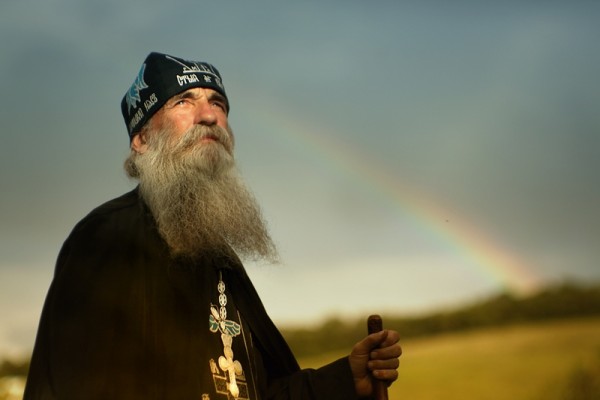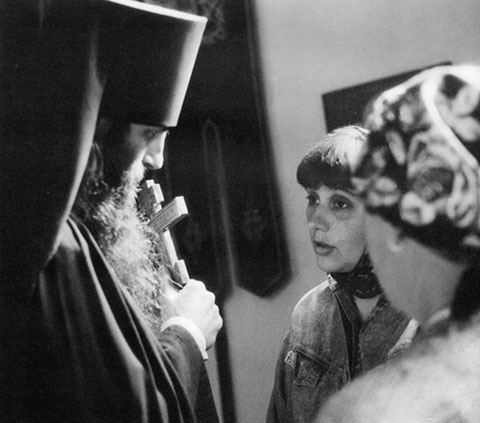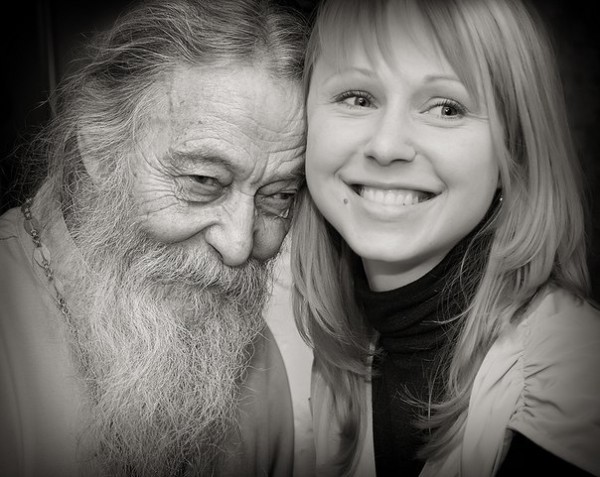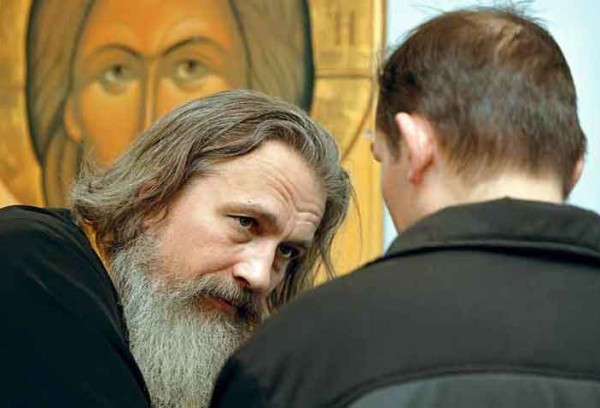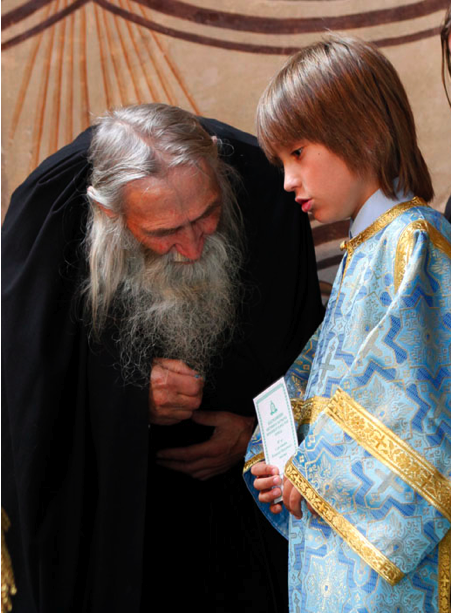And in that sense the words of Christ that He is the only Teacher, the only Master are supreme truth, there is no one else who can be a guide that can lead us from earth to heaven because He is the only One who came down from heaven, our living God become living man, and who can teach us those things which can make us also the sons and daughters of God and help us enter into God’s Kingdom.
So that the first thing which is the duty, the function of any spiritual guide, is to be rooted as deeply, as generously as possible in Christ and in the Gospel. In Christ because He is a living God who has come to speak to us of what H e alone knows, both of Himself, God, and of man whom He has created in His image; He is the only one who can unfold before us a vision of man. And secondly, His vision of man, His teaching is given us not only in prayerful communion, in prayerful meditation that places us face to face with Christ and roots us into His mystery, but also in the word He has spoken, and which is recorded and conveyed to us in the Holy Scriptures which to us are God’s word and truth.
The second function of a spiritual guide who, as I said, cannot take anyone by the hand and lead him into the Kingdom towards which he is moving himself and which he has not yet attained in its fullness, is pray for whomsoever commits himself to his charge. And praying does not mean mention a name to God hoping that God will do everything needed; it is accepting the person within his own heart, accept a person so deeply that he can identify with him or her and hold this person before God all the time and always. Two examples come to my mind.
The one indeed is not taken from Christian experience but from the book by Martin Buber called The Tales of the Hassidim, about a young Rabbi who on being asked how it was that he could have such powerful effect on any sinner who came for help, said: When someone comes to me, I go down into the depth of his sin, rung by rung, I tie the root of my soul to the root of his soul and knowing that his sin is my sin I repent before God and he repents with me… I think this way of perceiving the other person as being oneself, not only in an objective and distant solidarity but in the absoluteness of the oneness that exists between human beings is an essential condition.
But, there is another condition attached to it; we always think, and unfortunately, of our spiritual life and our spiritual growth in terms of struggling against evil in us, or discerning what is wrong and then timing our attention to all the darkness we can discover, and fighting it. A spiritual guide cannot lead anyone anywhere if he sees nothing but darkness, sin and evil; he can be a help only if, looking at each person he can see the inerradicable beauty of God’s image in this person, if he can look at the person and see this person in glory, see the beauty that cannot be erased and at the same time see that this beauty is badly damaged by sin, by circumstances, by whatever reason an image can be destroyed. We are like paintings of great masters or like the icons; if we were confronted with one of the greatest paintings of the world, or with an icon of supreme beauty that has suffered from time, from circumstances, from the carelessness or the hatred of men, we would be heartbroken at seeing how much is destroyed of its beauty, but how worshipfully, how tenderly we would treat it for the sake of what it was meant to be and what is left of it. And it is only by identifying with this unfathomable beauty of God in each person that we can begin to turn our eyes on what was destroyed or damaged, and try to bring it to life.
The other example which I had in mind, apart from what I said from the book of Martin Buber was that of a Russian priest in relation to one of his spiritual children. The man was very great, his spiritual son was very ordinary. And yet, when they met, once, twice a year, the spiritual son noticed with amazement that he had been carried forward by his spiritual Father as a little ship (?) attached to a big boat can be taken along. The distance between the little boat and the great one may be very great; and yet, the fact that the one moves Godwards results in the other one moving Godwards. But as I already said, on one condition: that the spiritual Father, the spiritual guide should a c c e p t his spiritual child into his own heart, into his own being, identifying in prayer and in veneration, so that whenever he stands with God, he stands in prayer before God, he should bring forth to God everyone of those who have entrusted themselves to him.
On another plane there is the (?) relationship; and I think one could make a distinction between several ways in which one relates to a spiritual guide. On one hand one may have a parish priest. The parish priest is bound to teach us the Gospel in its integrity and fullness, receiving himself the message and proclaiming it without adulteration. We may go to our parish priest occasionally, or regularly, to confession. But he may not be the spiritual guide that can take us along. He may help us on our way in practical matters, in details, in resolving certain problems. And then there is this great thing which is our spiritual Father. A Spiritual Father is one who gives us birth, who gives us birth into things eternal, things divine, who opens to us a gate which otherwise would have been closed. And this is something which is not to be found always and everywhere. At times one must be prepared to wait a long time for God to send us such a person.
The Spiritual Father will expect from us Orthodoxy. Orthodoxy means two different things united in one. The Greek word signifies the right, the true faith, and at the same time the right, perfect worship because we do believe that God cannot be known otherwise than in an act of adoration, of worship, of communion with Him, a communion in which God gives Himself to us and we open ourselves in faith, in obedience to His mystery and to His commandments. So that for us the law of faith and the law of worship, the rule of faith and the rule of worship are one and the same thing, and one cannot worship the Orthodox way without holding the Orthodox faith simply because otherwise every prayer will become a lie or must be explained away in one manner or another.
And then our Spiritual Father will confront us with our ultimate responsibility to ourselves and to God and consequently to everything else in the world. The role of the Spiritual Father is not to keep us in infancy and guide us from the day we meet him until the day he dies or we die, but to help us grow into maturity, to a maturity that will always mean the fellowship and the guidance of God, of the Saints, of our Spiritual Father, but a maturity which is not a dependence in the sense in which we use the word nowadays.
To be taught maturity is an essential thing in a Christian life because all too often it is not maturity which we are taught but a childish attitude to someone who is supposed to be wiser than we are and whom often, years later, we discover to be as ignorant of things divine as we were. His role is to place us face to face with our own soul and claim from us ultimate integrity, to stand before God in truth and to obey God as perfectly as we can.
‘Obey’ can be understood in two different manners: either submissiveness, enslavement, or openness, and intent, passionate listening. Christian obedience is not submissiveness and not subjection; Christian obedience, as the word has it in Latin, means listening, listening with all our mind, all our heart, all our being, in order to hear God speaking to us. And also listening to our own integrity, and asking ourselves: Am I now mature enough, true enough to say AMEN to what I have heard, and become the doer and not only the hearer of God’s commandments?..
The distinction is of importance; there is a passage, a daring one, in the writings of a Saint ascetic of the 5 or 6 century who says: Even if God stood before you and told you to do something, if your heart cannot say ‘Amen’ — don’t do it; because God doesn’t need your action, He needs your heart. He needs the harmony and the oneness that can be established between you and Him, and not that we should with fear and submissiveness do something which remains an outer action, and is not an expression of what you have learned and become yourself.
And in that the role of the Spiritual Father is not only to teach us maturity, but to teach us to overcome the inner resistance which we have to listening in order to hear, and to doing more than we imagine we are capable of doing. When we hear the word of God in the Gospel, we may not always be able to embody it in concrete forms and actions; but when our Spiritual Father, confronted with a concrete situation in our life says, This i s what God says, and this is how you should understand it in your present situation — then at times we must be prepared to say: I will do it with faith, I will do it trustfully, I will obey in humility because I cannot see the pattern of it, but I know that I trust the guidance which I receive… And then we learn on the one hand to overcome our fears, our self-centredness, our prejudices, our resistance, our unwillingness to hear, and also we learn to listen with all our mind and heart to words which are concrete and close. Concrete because they respond to a situation which is ours, and close because they are spoken to us personally and directly.
Question: How can we recognize our spiritual guide?
Answer: I think it is a miracle; I think we can have teachers, guides, but when, we meet the person whom God has sent on our way, there is no choice. I know, it is very un-English to speak in the first person, but I am obviously so un-English both in speech and looks, that you will not be surprised if I speak as a Russian. I remember how I discovered my Spiritual Guide; I came to a church which I had not visited yet; I arrived too late for the evening service, and I saw a man coming up the steps, because the church was in an underground garage. There was in him such total collectedness, and somehow such shining that I looked at him — I did not know who he was, but I came up to him, and said, Would you accept me and be my Spiritual Guide? And he was, until he died, and I never regretted the decision. I don’t think one chooses a Spiritual Guide on any kind of outer principle; in a way it is like choosing a husband or a wife — it’s as illogical and as certain. It’s illogical because why should we choose one person rather than the other, and yet one knows, and it is certain of an inner certainty… I am afraid, I cannot explain better; it is not the best man, or the best person — it is the only person.
Question: In England, in most of the Churches there is a great shortage of Spiritual Guides, of wise men and women; I wonder if you would agree with that and if so, what has happened to our Churches which has failed to nurture and to produce a tradition of spiritual directors. Church of E. used to have a tradition, but…
Answer: That is very much in the line of personal remarks one shouldn’t make! First of all I think, as far as I know England and the English, and I know both for the last 36 years only — there is this cult of privacy: Me protected in my castle. Religion is something one doesn’t speak; one is shy; I think one is more timid and cowardly than shy most of the time, but that is my opinion. To share one’s difficulties is something which the English very often feel one should not show one’s weakness, one must be strong. And these attitudes make it very difficult for people to come to one another or to a priest and say: Look! This is where I am… To present a concrete problem at times is all right, but to present one’s soul, to bare one’s own soul, to expose oneself in one’s frailty, weakness, lack of understanding is almost unbearable. When what one has got to say is dramatically great, it’s easier; but when it is small and mean… I remember how offended a number of people have been in the course of my ministry when they come and say: My main sin is pride, and I smile and say: O, do not kid yourself, you are far too small for that, it’s just vanity — people are absolutely indignant because to be as proud as Satan has greatness! — but to be as mean as vanity — no! And these things do prevent people from looking for spiritual guidance… On the other hand, what I have observed in this country is extraordinary shyness with which clergy approach people and give guidance on moral problems, on matters of faith, on so many things: just a pussy-pawing remark in one direction or another: ‘Of course you are free, but, if I may venture to say, I might tell you… instead of saying: Look here! You are about to drown! You are dirty from head to foot, it’s a bath you need! You are nothing of a great sinner, you are just a mean small thing that should learn to discern first of all that there is something honourable and great in you before you can make a move — this kind of thing… And I think in that respect what I perceive as the shocking watering down of faith in the Gospel which we observe now is one of the reasons. One can proclaim the Gospel only with certainty and passion; one cannot proclaim it tentatively. The Apostles did not go around saying: I have a vague impression that Christ is risen, then I suspect that if He is really God incarnate, He may have well being born of a Virgin — that kind of thing: they proclaimed what they believed to be true! And I think this is something on which one can build a spiritual life. The same is true about all the walks of life, all the things that result from it… So, my impression is that the Anglican Church is in a period of extreme crisis of faith. That is a central point: Is the Gospel God’s truth? Is the Gospel God’s word? Is the Gospel both in faith, in morals, in attitudes the standard of life which should be accepted and lived by? Not timidly, cowardly, in the ‘fear’ of God being afraid of Him, but with veneration and respect of God and of man… It sounds very rude, but…
‘I have asked for it!’












